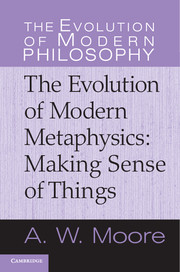Book contents
- Frontmatter
- Contents
- Preface
- Introduction
- Part One The Early Modern Period
- Part Two The Late Modern Period I
- Part Three The Late Modern Period II
- Chapter 15 Nietzsche
- Chapter 16 Bergson
- Chapter 17 Husserl
- Chapter 18 Heidegger
- Chapter 19 Collingwood
- Chapter 20 Derrida
- Chapter 21 Deleuze
- Conclusion
- Bibliography
- Index
Chapter 21 - Deleuze
Something Completely Different
from Part Three - The Late Modern Period II
Published online by Cambridge University Press: 05 June 2012
- Frontmatter
- Contents
- Preface
- Introduction
- Part One The Early Modern Period
- Part Two The Late Modern Period I
- Part Three The Late Modern Period II
- Chapter 15 Nietzsche
- Chapter 16 Bergson
- Chapter 17 Husserl
- Chapter 18 Heidegger
- Chapter 19 Collingwood
- Chapter 20 Derrida
- Chapter 21 Deleuze
- Conclusion
- Bibliography
- Index
Summary
Introduction
For the second time in this narrative something extraordinary happens. Gilles Deleuze (1925–1995) was a remarkable thinker, a polymath whose capacity for innovation was matched only by his capacity to assimilate ideas from others, each capacity reinforcing the other. He took philosophy in general and metaphysics in particular in all sorts of new directions. And he did so largely by releasing forces at work in his predecessors. The image of a figure ‘X’ which I used at the beginning of Chapter 5 has a certain aptness here too.
Foucault famously wrote, in a 1970 review of two of Deleuze’s most influential books, ‘Perhaps one day, this century will be known as Deleuzian’ (Foucault (1998), p. 343). Admittedly, Deleuze himself later suggested that this was ‘a joke meant to make people who like us laugh, and make everyone else livid’ (‘Letter to a Critic’, p. 4) – the joke being, as James Williams insightfully puts it, that Foucault, ‘a friend and inspiration to Deleuze’, was deliberately flouting ‘Deleuze’s opposition to the cult of the origin, to the dominance of the human self in the definition of values and to the limitation of thoughts to epochs’ (Williams (2003), p. 3). Yet, as Williams also goes on to observe, ‘Foucault’s mock prediction is turning out to be accurate’ (ibid.). There is a growing interest in Deleuze’s work which makes it increasingly difficult for anyone aspiring to make general sense of things not to reckon with his ideas.
- Type
- Chapter
- Information
- The Evolution of Modern MetaphysicsMaking Sense of Things, pp. 542 - 580Publisher: Cambridge University PressPrint publication year: 2011

